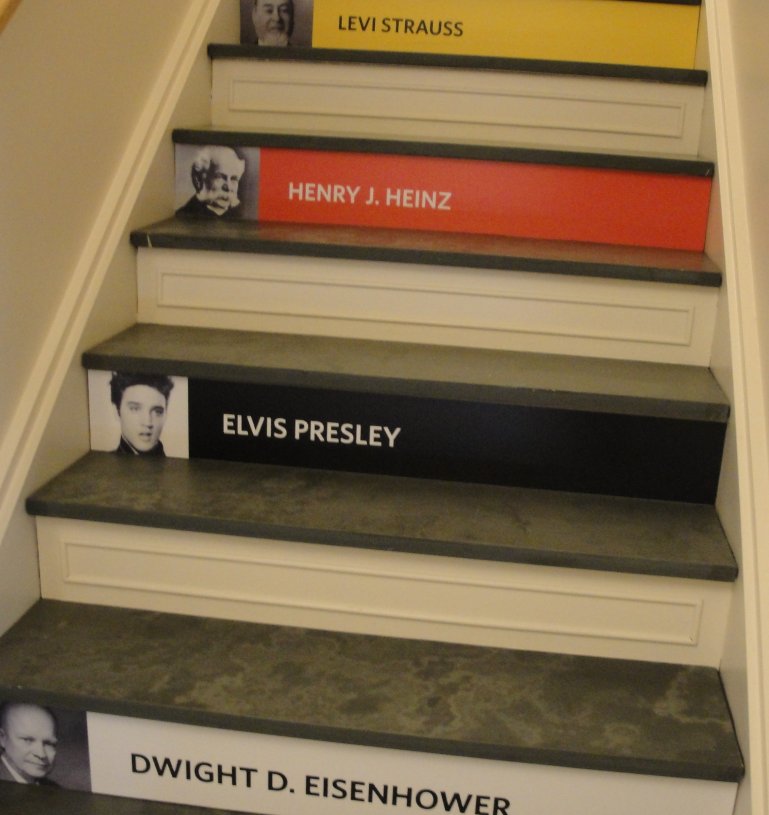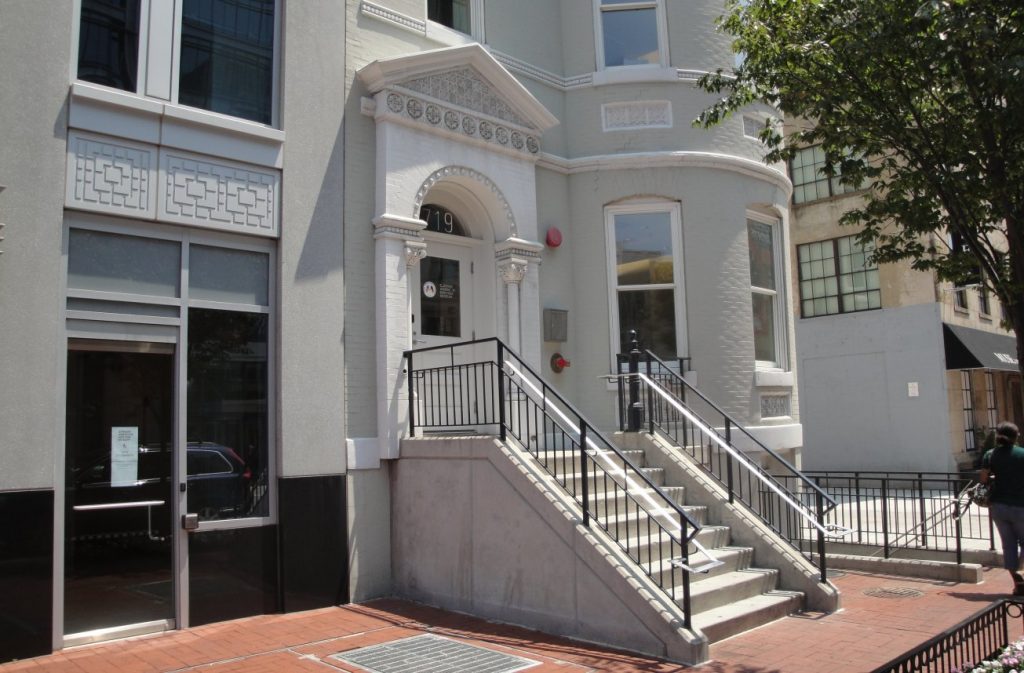
America’s largest ethnic group is German. Nearly a quarter of the American population or 58 million Americans claim German ancestry. It used to be a big deal; as far as I know the Germans never formed a group specifically called “the race” (as in La Raza) but some clearly had separatist notions. It is a tribute to the American assimilation machine that now it matters hardly at all. You can see some famous German-Americans on the stairs to the left. Who knew Elvis was German?
I had been meaning to go over to the German-American cultural center since I read about it in the paper. Yesterday I went. It is the kind of place that is worth seeing, but not worth going to see and you could easily miss it. Look at the picture below. The signs are small. Mostly, it is a permanent poster show detailing the long and varied contributions of Germans to American culture. Since German contributions are now as American and Americanized as hamburgers, hot dogs and potato salad, it is easy to overlook them and think that now is the first time we have really had such large influx of immigrants and foreign cultures.

Those who forget history are doomed to repeat it and those who remember will have to go along with them too, but it is interesting to consider the conditions that existed within living memory. So let me say a little about Germans & America. I grew up with it in Milwaukee, so talking about German-American culture is like talking about childhood. (The picture below is the Germania building in Milwaukee. They used to joke that the towers were like the spiked Kaiser helmets.) But I had a child’s understanding of it based on caricatures and molded by subsequent history. It is hard to put ourselves in the mindset of a century ago but I will try.

1910 was before the wars and before the atrocities. Germany in those days was arguably the most advanced country in terms of science and technology. An American who really wanted to learn science had to learn German. It was like English is today to sciences. This persisted. When I was growing up, the stereotype of a scientist was a guy with a beard and a German accent. During our space race with the Soviets, it is largely true that our German rocket scientists competed with their German rocket scientists. We probably could not have achieved what we did in space flight w/o Germans and the Russians certainty did not have the home grown talent to compete with us.
Germans also pioneered what became the research university. Our American universities resemble them because we specifically imported German methods, ideas and often Germans themselves to remake our system during the late 19th and early 20th Centuries. If we see Germany through the prism of the Third Reich and the World Wars, we see it in entirely a different way than our grandparents would have in 1910. Germany under Wilhelm II was not a full democracy, but it was more democratic than most of the current UN members today and it was certainly less corrupt that most of the world’s countries now. They held regular, generally free elections. There was a strong respect for the rule of law and reasonable protection of individual rights. If you can look beyond the pomp and circumstance of the aristocracy, you see that in terms of democracy, rights, rule of law & transparency, Germany of 1890-1910 would compare favorably to most of the world’s countries a hundred years later (1990-2010) and has big modern countries such as Russia & China clearly beat.
Although emigration to the U.S. declined after German unification and subsequent massive economic growth, there still were more opportunities in the U.S. and we continued to draw German immigrants. But it was a different sort of immigration in many ways. As I mentioned above, Germany was one of the world’s most advanced countries, with technical and scientific skills at a par or above our own. This situation just doesn’t exist anymore. Today technically savvy immigrants are still important to us, but they usually develop their skills and/or use technologies already available in America. A century ago, we were much more the recipients of skills and technology transfer. We all know that immigrant muscle helped build America, but we may overlook that immigrant brains also had a big role in designing it, none more so than the Germans.

We made an effort to wash the German out of our national memory. During World War I, sauerkraut became liberty cabbage; dachshunds became dash hounds; frankfurters became hot dogs and hamburger was renamed Salisbury steak; many streets changed their names and so did many families. Germans assimilated much faster than they might have otherwise. Wars do things like that and we have a way of trying to fit the events of the past into our current narrative. The problem is that the German heritage just doesn’t fit well into what we think of them and ourselves today. And now we don’t think much of it at all. That is why the German American heritage museum is kind of depressing. It is now located in the middle of Washington’s Chinatown. Immigrant communities come and go.
All this is past. History happened as it did and we cannot change it. People in the past did what they did, but we have to remember that history didn’t have to happen that way. Just as our futures are not determined, neither were theirs. W/o that unfortunate and almost random event in Sarajevo (that pathetic little loser, Gavrilo Princip, actually got lost and the Archduke’s car passed him by chance. Terrorists only have to get lucky once) and the incompetent reactions in 1914 how different the world could have been.
